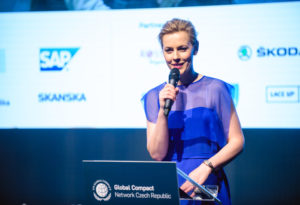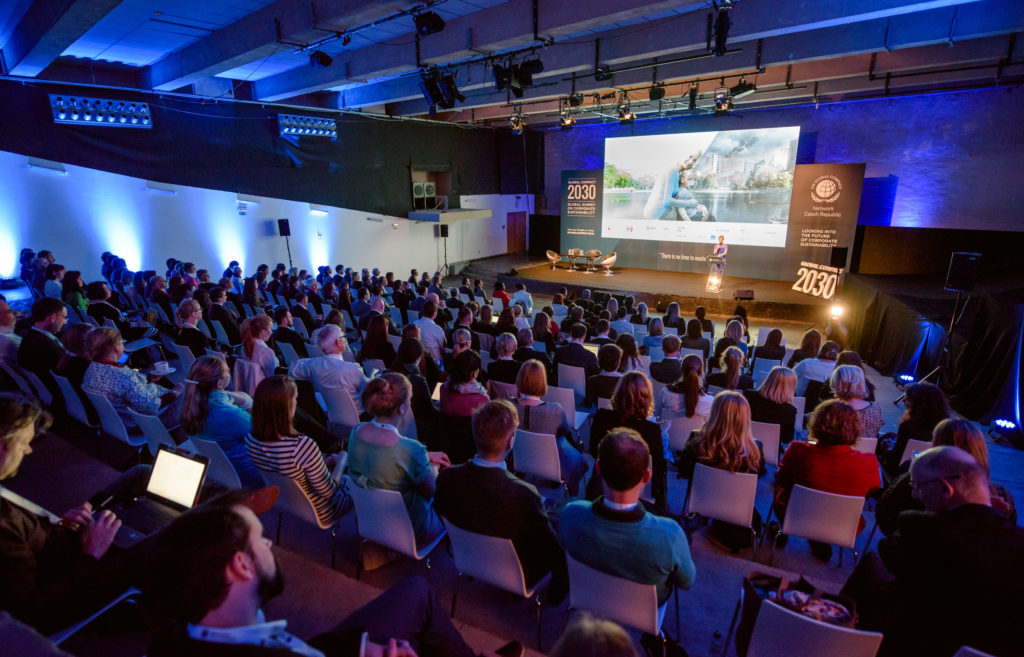Global Summit on Corporate Sustainability
Bringing the World to Prague Because There Is No Time to Waste
Imagine a conference where major experts and representatives from government, corporations, SMEs and start ups as well as NGOs meet to discuss common responsibility and actions to be taken to improve the lives of population coming from all over the world as well as from the Czech Republic. The issues debated and suggested do not concern projects and populations in faraway countries of Africa and Asia, but specific projects are shared that make a difference to people in the Czech Republic, such as the case of SAP and its Autism at Work initiative.
Imagine a conference that takes place not at an expensive five-star hotel, but in inspirational premises of the National Gallery.
Imagine a conference where panels are gender balanced; in many cases the organisers actually had to look for men to participate.
Imagine a conference, where the key note speaker, Dr. Tererai Trent, is the one of the most internationally recognised voices for quality education and women’s empowerment and the one of the most popular hosts of Oprah Winfrey.
Imagine a conference that serves vegetarian food to reduce carbon footprint, has music entertainment during the breaks and visual recordings to remind attendees of key messages.

Lucie Mádlová
Meet the woman who made it all possible on May 4, 2016 in Prague. It is a pleasure to introduce you to Lucie Mádlová, the Global Compact Network Czech Republic Representative and Executive Director of Association of Social Responsibility.
Lucie, how do you perceive today’s world?
It is wonderful how many opportunities and how much beauty we can enjoy in today’s world. It is beyond comprehension that we do not appreciate what is given, and by excessive, rakish consumption and unsustainable behaviour we are destroying lives of future generations. The more we have, the more we desire. We buy things we do not need, we are destroying natural resources, and our behaviour has a substantial impact on climate change. The data is more than worrying. More than a billion people does not have access to drinking water, while to many of us it literally trickles through our fingers. Three billion kilograms of food are wasted annually, while more than 795 million people are suffering from starvation. We are going to theatres to see disaster movies, not admitting to ourselves we might watch a harsh reality of upcoming days, unless we reconsider our unsustainable behaviour.
How do you perceive the role of the Czech Republic?
Regarding sustainability we are barely scratching the surface. We still have plenty of room for improvements and for inspiration from more developed countries. Our recent study showed that in the interest of sustainability people of the Czech Republic mostly save energy, avoid wasting food, save tap water, and sort waste. The study also confirmed that in comparison to 2013, people are more engaged in global issues in general. In addition, the data shows that 4 out of 5 Czechs think the government should be involved in reaching new Sustainable Development Goals (SDGs), and 3 out of 4 would also include the private sector. It should be mentioned that a young, emerging generation is the one most interested in those topics which fit into its lifestyle. I consider it a positive trend; young people are not selfish, they are considerate and thoughtful, which is a great opportunity for employers. Young people want to work for a society which shares the same values, and social responsibility of their potential employer is a crucial criteria for many of them.
How does it happen that you manage to bring attention to the topics of corporate sustainability to the Czech Republic, to the country where population believes it’s primarily government’s responsibility to fulfil Sustainability Development Goals?
New Sustainable Development Goals (SDGs) were unanimously adopted by the UN member states (including the Czech Republic) in September 2015 with the objective to build a better future for everyone. SDGs clearly sets a direction for upcoming 15 years, leading to eradication of poverty, to a struggle with inequality, and to security of our planet. The wording of SDGs is a result of a collaboration of not only the UN member states, but also representatives of civil society, private sector, and academia of all continents. So, at the Summit Global Compact 2030, we did want to demonstrate to the private sector that SDGs bring opportunities for contributions to not only a better and sustainable future, but also for new investments.
The gender equality is one of the 17 goals, implied in many others. Are you in favour of quotas or do you suggest another approach for companies? And how do you see the fact that women often do not support women?
Women in the Czech Republic, on average, earn 22% less than men in the same occupation. More than 95% of CEOs of global corporations are men. Current projections show women will not have the same economic opportunities as their male counterparts until 2096. Certainly, something must be done about this. However, I am not sure whether the quotas are the best solution. In recent years companies themselves set ambitious goals to support equality of opportunity within their organisations and within their respective countries. And they are starting to realise that their investments into equality are returning. For example, in 2015 the leading management of Unilever consisted of, for the first time in history, mainly female managers. This is supported by a whole range of global campaigns advocating gender equality in a workplace such as HeForShe or UN Women. The campaign urges men to speak out against any form of discrimination or violence against women in their workplace or in their private life. Many significant figures and representatives – men – of the private and the public sector from all over the world are actively supporting the initiative.

Being able to witness your energy and dedication, and knowing that you are a mother of a 4-year-old daughter, what is your approach to work-life balance?
Honestly, work-life balance is one of the few things I struggle to get under control. I take work home with me, I go to sleep thinking about it and I am waking up with it. On the top of that I share an office with my husband, so our private life and our work life are fairly blended to a certain extent. And even when we find a moment only for ourselves, we manage to come up with new, interesting ideas, especially in the evening while having a bath or before falling asleep. Even though recently I feel like I am so exhausted I fall asleep even before we say goodnightJ. Mia was 8 months old when I founded the association. I worked during a part of a day she was sleeping, and then overnight. Now, she goes to a preschool but I am trying my best to spend some quality time with her whenever I can. Moreover, we devote Fridays only to ourselves, spending some good chunk of time together.
What are your final words for Czech and Slovak Leaders readers?
The way to sustainability is in our common interest. SDGs bring the most solid plan to date for new companies to find opportunities regarding the challenges of a modern society. And we are not talking charity here. Effective inclusion of sustainability into a business strategy requires a serious commitment. Cooperation is also vital. Companies must understand that cooperation – even with their competitors – is necessary, followed by common investment into common goals, facing systemic challenges. As one African proverb says: If you want to go fast, go alone; if you want to go far, go together.
By Linda Štucbartová
UN Global Compact is the world’s largest corporate sustainability initiative. It has 13 000 signatories, 160 countries and 85 local networks. It encourages companies to align strategies and operations with universal principles on human rights, labour, environment and anti-corruption, and take actions that advances societal goals. Since 2015, the Global Compact Network Czech Republic has been active in engaging both local firms and subsidiaries of foreign corporations engaged in the Global Compact with respect to implementation of of the ten principles, while also creating opportunities for sharing knowledge, learning, collective action and partnership.

